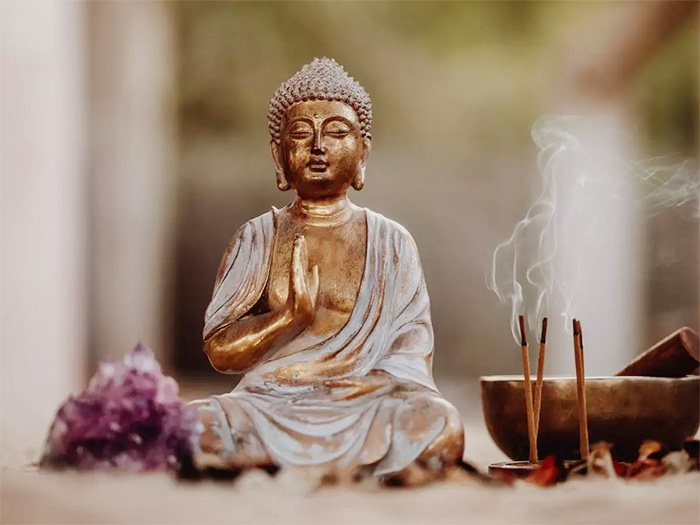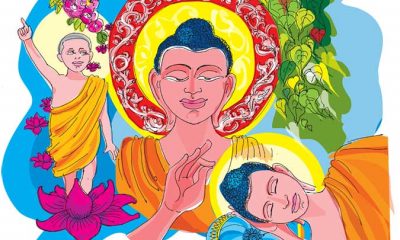Opinion
Misunderstanding words of the Buddha

By Dr Upul Wijayawardhana
The three meritorious practices (Punna Kammas) the Buddha advocated for the purification of our existence are generosity (Dana), ethical conduct (Seela) and meditation (Bhawana). Dana and Seela are considered essential foundations for meditation, which when practised rigorously can lead to the total detachment of mind. But this can be achieved only through Vipassana or Mindfulness meditation, which the Buddha introduced, not through Samatha or concentration meditation, which can lead to higher mental states but not total detachment. Of these three, the most misunderstood, especially in Sri Lanka, is Dana.
We, Sri Lankans, are well known for our generosity even in times of hardship. Danselas are held during Vesak when free food is virtually forced on people, a practice unseen in any other country in the world. Praiseworthy as this activity may be, most of those who engage therein do so for the wrong reason––to get rewards either later in this life or in the next birth. For some, rebirth is almost an obsession and, hence, they worry more about the next life than this! Unfortunately, this misunderstanding has spread far and wide with some Westerners categorising Buddhism as a religion of insurance. They do not realise that what the Buddha taught is how to achieve just the opposite–– ultimate detachment.
Dana
, is giving without any anticipation of rewards or ulterior motives and is a means to achieving detachment. Not that it does not have benefits; if practised properly, the act of giving can generate mental satisfaction and happiness. Unfortunately, the practice of Punyanumodana, where at the end of a Dana, a Bhikkhu melodiously recites the journey through rich afterlives including sojourns in heavens is greed promoting.
Fortunately, this practice is on the decline and what is heard now is a shortened version, wherein it is stated that this meritorious activity will help us in our journey for the realisation of Nibbana. This is perfectly valid as Dana and Seela prepare the ground for the mind to be at peace for liberating meditation.
Perhaps, the biggest misunderstanding is about the attitude of Buddha towards women.
In researching this subject, I came across an extremely informative and interesting website ‘suttacentral.net’ co-produced by Bhikkhu Sujato. Opinions of his and other learned Bhikkhus’ opinions are published there. Bhikkhu Sujato, born Anthony Best in Perth, Western Australia is an ex-musician, and member of the Alternative rock Australian band ‘Martha’s Vineyard’ from 1986 to 1990. He was ordained under Ajahn Chah in Thailand in 1994 and a few years after higher ordination returned to Australia and spent several years at Bodhinyana Monastery in Western Australia before going on to found Santi Forest Monastery in 2003.
Bhante Sujato, along with his teacher Ajahn Brahm were involved with re-establishing Bhikkhuni Ordination in the Forest sangha of Ajahn Chah. The ordination ceremony led to Ajahn Brahm’s expulsion from the Thai Forest Lineage of Ajahn Chah. Bhante Sujato, not intimidated by that response, and remaining faithful to his convictions that there was no reason the Bhikkhuni order should not be revived, went on to successfully found Santi Forest Monastery in Australia, and following his wishes, Santi has since flourished as a Bhikkhuni (Buddhist nun) monastery Vihara since 2012.
In the section titled, “A Thematic Guide to the Anguttara Nikaya” in the Suttacentral website (), copied from Bhikkhu Bodhi’s book, “The Numerical Discourses of the Buddha”, there is a subsection titled “Bhikkhunis and Women in the Anguttara Nikaya” which is very informative. By the way, Bhikkhu Bodhi is an American who was ordained in Sri Lanka and the president and the editor of the Buddhist Publications Society in Kandy for a very long time. He refers to the controversies regarding the ordination of women, which I too have referred to in my writings, and states that Gothamisutta has been responsible for a distrustful attitude towards Bhikkhunis in Theravada countries and may explain why conservative elders have resisted the revival of the Bhikkhuni Sangha currently taking place in such countries as Sri Lanka and Thailand.
What shocked me most was the attribution of the derogatory comments on women to the Buddha. Though complimentary comments are also referred to, I shall repeat only the paragraph referring to adverse comments:
“Among the four Niakyas, the Anguttara has the largest number of suttas addressed to women, but a small number of discourses in the collection testify to a misogynistic attitude that strikes us as discordant, distasteful, and simply unjustified. These texts depict women as driven by powerful passions that impair their abilities and undermine their morals. At AN 2.61, the Buddha declares that women are never satiated in two things: sexual intercourse and giving birth. When Ananda asks why women do not sit on councils, engage in business, or travel to distant regions, the Buddha answers that this is because they are full of anger, envious, miserly, and devoid of wisdom (AN 4.80). Two suttas compare women to a black snake (AN 5.229–30) in that they are “wrathful, hostile, of deadly venom, double-tongued, and betray friends.” Their venom is their strong lust; their double-tongue is their proclivity to slander; and they betray friends in that “for the most part women are adulterous.”
Bhikkhu Bodhi comments on these as follows:
“Whether such statements should really be attributed to the Buddha or regarded as interpolations by monastic editors is a question that may not be possible to settle with complete certainty. They are surely contrary, however, to the more liberal spirit displayed elsewhere in the Buddha’s discourses. Moreover, in a text like the Anguttara Nikaya, with its many short suttas, it would have been relatively easy for monks, apprehensive about their own sexuality or the spiritual potentials of women, to insert such passages into the canon. These suttas do not have counterparts in the Chinese Agamas, but that fact on its own is inconclusive; for many suttas in the Pali Anguttara Nikaya are without counterparts in the Chinese canon.”
In fact, I would go a step further and say that these are, almost certainly, interpolations. My reasoning, based on the application of principles laid down by the Buddha in the Kalama sutta wherein He encouraged us to reason, is as follows:
1. Would the Buddha who preached equality have made an exception when it came to women? Hardly likely.
2. Overarching feature of Buddha’s teachings is compassion. The Buddha never spoke ill of even those who tried to harm him. Did his compassion not extend to women
3. Even if one assumes, at worst, that the Buddha had some reservations about women, reflecting the prevailing attitudes of the day, would he have used such derogatory language? Impossible!
4. It is very well-known that all the Suttas in Sutta Pitaka are not preachings of the Buddha though Theravada scripts are supposed to be the least contaminated.
Surely, the Buddha was not a male chauvinist for all these reasons. It looks as if, in an act of self-preservation, monastic editors had interpolated their opinions in the harshest possible language, totally unlike that of the Buddha. It is a great shame that they did not realise that in doing so, they have insulted the memory of their Great Teacher. In fact, these are not misinterpretations but gross distortions!
Opinion
Missing 52%: Why Women are absent from Pettah’s business landscape

Walking through Pettah market in Colombo, I have noticed something both obvious and troubling. Shop after shop sells bags, shoes, electronics, even sarees, and yet all shops are owned and run by men. Even businesses catering exclusively to women, like jewelry stores and bridal boutiques, have men behind the counter. This is not just my observation but it’s a reality where most Sri Lankans have observed as normal. What makes this observation more important is when we examine the demographics where women population constitute approximately 52% of Sri Lanka’s population, but their representation as business owners remains significantly low. According to the Global Entrepreneurship Monitor 2023 report, Sri Lanka’s Total Early Stage Entrepreneurial Activity rate for women is just 8.2%, compared to 14.7% for men.
Despite of being the majority, women are clearly underrepresented in the entrepreneurial aspect. This mismatch between population size and economic participation create a question that why aren’t more women starting ventures? The answer is not about capability or intelligence. Rather, it’s deeply in social and cultural barriers that have been shaping women’s mindsets for generations. From childhood, many Sri Lankan girls are raised to believe that their primary role is as homemakers.
In families, schools, and even universities, the message has been same or slightly different, woman’s success is measured by how well she manages a household, not by her ability to generate income or lead a business. Financial independence is rarely taught as essential for women the way it has been for men. Over time, this messaging gets internalised. Many women grew up without ever being encouraged to think seriously about ownership, leadership, or earning their own money. These cultural influences eventually manifest as psychological barriers as well.
Years of conditioning have led many skilled women to develop what researchers call “imposter syndrome”, a persistent fear of failure and feel that they don’t deserve success kind of feeling. Even when they have the right skills and resources, self-doubt holds them back. They question whether they can run a business independently or not. Whether they will be taken seriously, whether they are making the right choice. This does not mean that women should leave their families or reject traditional roles. But lack of thinking in a confident way and make bold decisions has real consequences. Many talented women either never start a business or limit themselves to small, informal ventures that barely survive. This is not about men versus women. It’s about the economic cost of underutilising 52% of the population. If our country is genuinely serious about sustainable growth. we must build an inclusive entrepreneurial ecosystem through confidence building programs, better finance access to women, and a long term societal mindset shift. Until a young girl walking through Pettah can see herself as a future shop owner rather than just a customer, we will continue to waste our country’s greatest untapped resource.
Harinivasini Hariharasarma
Department of Entrepreneurship
University of Sri Jayewardenepura
Opinion
Molten Salt Reactors

Some essential points made to indicate its future in Power Generation
The hard facts are that:
1) Coal supplies cannot last for more than 70- 100 years more at most, with the price rising as demand exceeds supply.
2) Reactor grade Uranium is in short supply, also with the price rising. The cost is comparable to burning platinum as a fuel.
3) 440 standard Uranium reactors around the world are 25-30 years old – coming to the end of their working life and need to be replaced.
4) Climate Change is increasingly making itself felt and forecasts can only be for continuing deterioration due to existing levels of CO2 being continuously added to the atmosphere. It is important to mention the more serious problems associated with the release of methane gases – a more harmful gas than CO2 – arising from several sources.
5) Air pollution (ash, chemicals, etc.) of the atmosphere by coal-fired plants is highly dangerous for human health and should be eliminated for very good health reasons. Pollution created by India travels to Sri Lankans by the NE monsoon causing widespread lung irritations and Chinese pollution travels all around the world and affects everybody.
6) Many (thousands) of new sources of electric power generation need to be built to meet increasing demand. But the waste Plutonium 239 (the Satan Stuff) material has also to be moved around each country by lorry with police escort at each stage, as it is recovered, stored, processed and formed into blocks for long term storage. The problem of security of transport for Plutonium at each stage to prevent theft becomes an impossible nightmare.
The positive strengths to Thorium Power generation are:
1) Thorium is quite abundant on the planet – 100 times more than Uranium 238, therefore supplies will last thousands of years.
2) Cleaning or refining the Thorium is not a difficult process.
3) It is not highly radioactive having a very slow rate of isotope decay. There is little danger from radiation poisoning. It can be safely stored in the open, unaffected by rain. It is not harmful when ingested.
4) The processes involved with power generation are quite different and are a lot less complex.
5) Power units can be quite small, the size of a modern detached house. One of these can be located close to each town, thus eliminating high voltage cross-country transmission lines with their huge power losses (up to 20%).
6) Thorium is ‘fertile’ not fissile: therefore, the energy cycle has to be kick-started by a source of Neutrons, e.g., fissile material, to get it started. It is definitely not as dangerous as Uranium.
7) It is “Fail – Safe”. It has walk-away safety. If the reactor overheats, cooled drain plugs unfreeze and the liquid drains away to storage tanks below. There can be no “Chernobyl/ Fukoshima” type disasters.
8) It is not a pressurized system; it works at atmospheric pressure.
9) As long as reactor temperatures are kept around 600 oC there are little effects of corrosion in the Hastalloy metal tanks, vessels and pipe work. China, it appears, has overcome the corrosion problem at high temperatures.
10) At no stage in the whole chain of operations is there an opportunity for material to be stolen and converted and used as a weapon. The waste products have a half- life of 300 years, not the millions of years for Plutonium.
11) Production of MEDICAL ISOTOPE Bismuth 213 is available to be isolated and used to fight cancer. The nastiest cancers canbe cured with this Bismuth 213 as Targetted Alpha therapy.
12) A hydrogen generation unit can be added.
This information obtained from following YouTube film clips:
1) The Liquid Fluoride Thorium Reactor – what Fusion wanted to be…
2) An unbiased look at Molten Salt Reactors
3) LFTR Chemical Processing by Kirk Sorensen
Thorium! The Way Ahead!
Priyantha Hettige
Opinion
Foreign degrees and UGC

There are three key issues regarding foreign degrees:
Recognition: Is the awarding university recognized by our UGC?
Authenticity: Is the degree genuine or bogus?
Quality: Is it a standard, credible qualification?
1. The Recognition Issue (UGC Role)
The UGC addresses the first issue. If a foreign university is listed in the Commonwealth Universities Yearbook or the International Handbook of Universities, the UGC issues a letter confirming that the university is recognized. However, it is crucial to understand that a recognized university does not automatically imply that every degree it issues is recognized.
2. The Authenticity Issue (Employer Role)
The second issue rests with the employer. It is the employer’s responsibility to send a copy of the foreign degree to the issuing university to get it authenticated. This is a straightforward verification process.
3. The Quality Assurance Gap
The third issue
—the standard and quality of the degree—has become a matter for no one. The UGC only certifies whether a foreign university is recognized; they do not assess the quality of the degree itself.
This creates a serious loophole. For example:
Does a one-year “top-up” degree meet standard criteria?
Is a degree obtained completely online considered equivalent?
Should we recognize institutions with weak invigilation, allowing students to cheat?
What about curricula that are heavy on “notional hours” but light on functional, practical knowledge?
What if the medium of instruction is English, but the graduates have no functional English proficiency?
Members of the UGC need to seriously rethink this approach. A rubber-stamp certification of a foreign university is insufficient. The current system ignores the need for strict quality assurance. When looking at the origins of some of these foreign institutions (Campuchia, Cambodia, Costa Rica, Sudan..) the intentions behind these “academic” offerings become very clear. Quality assurance is urgently needed. Foreign universities offering substandard degrees can be delisted.
M. A. Kaleel Mohammed
757@gmail.com
( Retired President of a National College of Education)
-

 Features2 days ago
Features2 days agoWhy does the state threaten Its people with yet another anti-terror law?
-

 Features2 days ago
Features2 days agoVictor Melder turns 90: Railwayman and bibliophile extraordinary
-

 Features2 days ago
Features2 days agoReconciliation, Mood of the Nation and the NPP Government
-

 Features18 hours ago
Features18 hours agoLOVEABLE BUT LETHAL: When four-legged stars remind us of a silent killer
-

 Features2 days ago
Features2 days agoVictor, the Friend of the Foreign Press
-

 Latest News3 days ago
Latest News3 days agoNew Zealand meet familiar opponents Pakistan at spin-friendly Premadasa
-

 Latest News3 days ago
Latest News3 days agoTariffs ruling is major blow to Trump’s second-term agenda
-

 Latest News3 days ago
Latest News3 days agoECB push back at Pakistan ‘shadow-ban’ reports ahead of Hundred auction



















